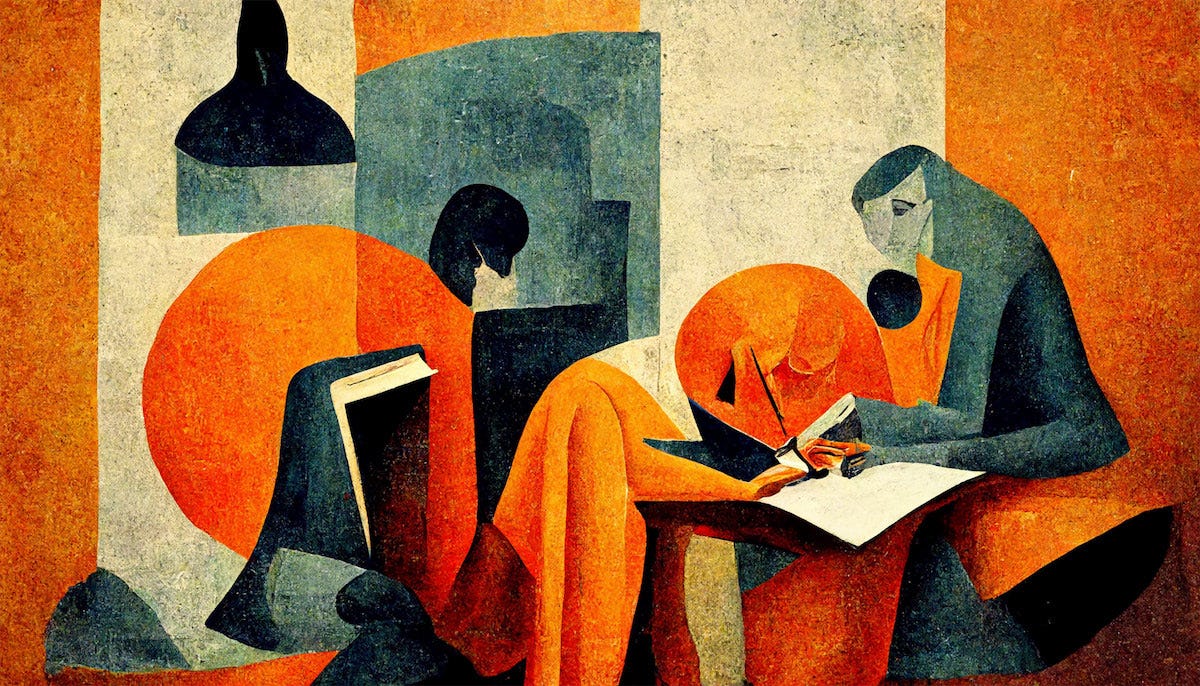The Future of Writing Is Social
Exceptional writing is forged through collaboration. It's time to retire the lone genius myth and embrace a better way.
Editor’s Note: This is the original Foster manifesto, first published in 2021. Though our vision continues to expand, we’re republishing it here as an artifact of our history, and as a reminder of our roots.
Imagine a writer. What do you see?
Perhaps a weary figure hunched over a laptop. Maybe an aging academic scribbling under candlelight? Or a lone train passenger, staring out the window in between journal entries.
Whoever you imagine, they're likely alone.
But capturing ideas in words is only part of a writer's job. Discovering and then refining those ideas is the other part, and this is rarely effective when done in isolation.
Conversations reveal ideas we never knew we had. Friendly debates help us clarify our views. A casual comment can uncover new ways for us to think. Interacting with diverse sets of people radically expands our vision.
Still, most writers work in isolation, without an editor or collaborative writing environment of any kind. Professional editors are expensive and often inaccessible. Writers' rooms exist mostly within media institutions. Friends and family mean well but rarely provide useful feedback.
At Foster, we write together.
As a community of writers, editors, and experts, we foster ideas from conception to publication. We collaborate through editing, workshops, peer groups, and personal partnerships. We each remain independent, yet supported by hundreds of peers.
Foster's members improve their writing in two ways: first by writing and second by collaborating. We write original work and ask for the input of others, and we contribute when other members invite our input.
In our first year, we collectively nurtured more than 1,000 pieces, and our writers have cited each other in published work more than 1,400 times.
Over 100 of us wrote this manifesto together. Through thousands of hours of writing together, we've forged a few beliefs:
Exceptional writing is collaborative.
Your favorite book probably features a long list of names under the heading “Acknowledgements.” Writers thrive when smart, motivated peers contribute to their work.
We've seen this firsthand at Foster, where free-form discussions nurture half-formed ideas into compelling narratives. Collaboration transforms cluttered drafts into clear, focused, timeless pieces of writing. Peers help each other build conviction and take risks they wouldn't have taken alone.
Collaborating on another writer's work can inspire us to write something new ourselves. It builds a generative, discerning perspective we take back to our own work. Put simply, contributing to somebody else's writing is one of the fastest ways to become a better writer yourself.
This symbiosis is at the core of Foster.
Collaboration is an act of human connection.
Through contributing to each others' work, we engage in rich discourse, form new relationships, support perspectives we care about, and deepen our subject-matter expertise. Far from being transactional, this act of providing feedback on another writer's work is deeply fulfilling, rewarding, and fun.
By looking at our work through the lens of another, we see more than we can alone. We also build lasting human connections by momentarily viewing the world through the eyes of our collaborators.
Diverse collaborators produce better work.
We cannot grow without first seeing outside of ourselves. This is why we need the input of people who are different from us.
We're proud of our diverse community—filled with editors, domain experts, and writers from every walk of life—committed to providing constructive feedback to each other. A variety of perspectives, races, cultural identities, sexual orientations, religions, abilities, ages, and gender identities elevate our thinking and enrich the written word.
Write With Us
Ideas deserve time, space, and attention to develop, including the ideals of our community. This document is a living, breathing representation of our collective beliefs that we plan to expand over time, together.
We look forward to welcoming new writers to co-author our future with us.
If this manifesto speaks to you, join us.
Acknowledgments
Thank you to the Foster members and investors who helped contribute to this document: Ellen Fishbein, Michell C. Clark, Packy McCormick, Marcus Whitney, Steven Ovadia, Nick deWilde, Joey DeBruin, Soma Mandal, Chinyere Erondu, Bobby Brazen, Sarah Guo, Eva Gutierrez, John Harlow, Chris Harvey, Michael Jones, Sara Campbell, Amanda Natividad, Nanya Sudhir, Casey Rosengren, Lyle McKeany, Kushaan Shah, Camila Mirabal, Ross Gordon, Joshua Mitchell, Alexander Hugh Sam, Jonah Baer, Anushri Kumar, Richie Bonilla, Nick Drage, Zac Zager, Gayatri Taley, Yael Hendel, Vandan Jhaveri, Eric Friedman, Ergest Xheblati, Katie O'Connell, David Zelniker, Nate Kadlac, Derek van Pelt, Rob Hardy, Ayomide Adebayo, Cameron Zargar,Rajat Mittal, Matthew Vere, Chiara Cokieng, Patrick Ward, Elizabeth Michael, Stephen Scott, Ryan Williams, Diana Hawk, Oliver Palmer, Steve Morin, Minnow Park, Sunil Suri, John Lanza, Gian Segato, Brett Friedman, Daniel Li, Alfonso Guerrero, Kavir Kaycee, Alberto Arenaza, Lauren Maslen, Roseline Anya Okorie, Sarah Ramsey, Chris Angelis, Nathan Winfrey, Joaquin Roman, Elisa Doucette, Adam Thomas, Kelly Walborn, Jon Allen, Joel Christiansen, Ayomide Ofulue, Philip Hendricks, Sonnie Bailey, Jen Vermet, Todd Heine, Yina Huang, Joshua Poh, Sean MacMannis, Michael Saloio, Kyla Scanlon, Ziga Brencic, Michael Shafer, Angelo Belardi, Dylan Lau, Kyle Eschenroeder, and many more.


